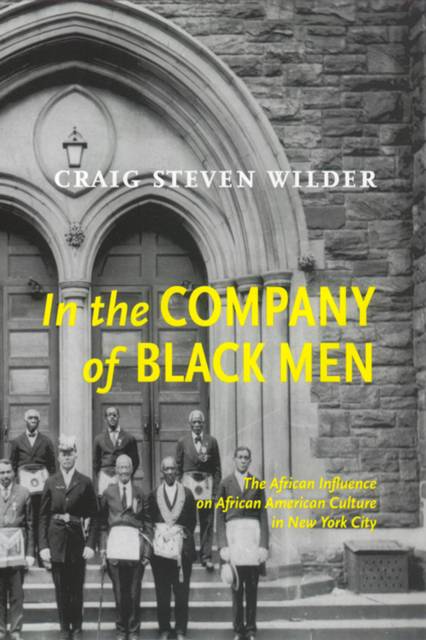
Wil je zeker zijn dat je cadeautjes op tijd onder de kerstboom liggen? Onze winkels ontvangen jou met open armen. Nu met extra openingsuren op zondag!
- Afhalen na 1 uur in een winkel met voorraad
- Gratis thuislevering in België vanaf € 30
- Ruim aanbod met 7 miljoen producten
Wil je zeker zijn dat je cadeautjes op tijd onder de kerstboom liggen? Onze winkels ontvangen jou met open armen. Nu met extra openingsuren op zondag!
- Afhalen na 1 uur in een winkel met voorraad
- Gratis thuislevering in België vanaf € 30
- Ruim aanbod met 7 miljoen producten
Zoeken
In the Company of Black Men
The African Influence on African American Culture in New York City
Craig Steven Wilder
Hardcover | Engels
€ 150,95
+ 301 punten
Uitvoering
Omschrijving
Traces the development of African-American community traditions over three centuries
From the subaltern assemblies of the enslaved in colonial New York City to the benevolent New York African Society of the early national era to the formation of the African Blood Brotherhood in twentieth century Harlem, voluntary associations have been a fixture of African-American communities. In the Company of Black Men examines New York City over three centuries to show that enslaved Africans provided the institutional foundation upon which African-American religious, political, and social culture could flourish. Arguing that the universality of the voluntary tradition in African-American communities has its basis in collectivism--a behavioral and rhetorical tendency to privilege the group over the individual--it explores the institutions that arose as enslaved Africans exploited the potential for group action and mass resistance. Craig Steven Wilder's research is particularly exciting in its assertion that Africans entered the Americas equipped with intellectual traditions and sociological models that facilitated a communitarian response to oppression. Presenting a dramatic shift from previous work which has viewed African-American male associations as derivative and imitative of white male counterparts, In the Company of Black Men provides a ground-breaking template for investigating antebellum black institutions.Specificaties
Betrokkenen
- Auteur(s):
- Uitgeverij:
Inhoud
- Aantal bladzijden:
- 333
- Taal:
- Engels
Eigenschappen
- Productcode (EAN):
- 9780814793688
- Verschijningsdatum:
- 1/02/2002
- Uitvoering:
- Hardcover
- Formaat:
- Genaaid
- Afmetingen:
- 160 mm x 234 mm
- Gewicht:
- 612 g

Alleen bij Standaard Boekhandel
+ 301 punten op je klantenkaart van Standaard Boekhandel
Beoordelingen
We publiceren alleen reviews die voldoen aan de voorwaarden voor reviews. Bekijk onze voorwaarden voor reviews.











